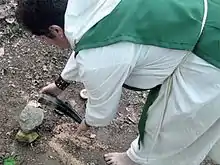Dun Ailline Druid Brotherhood
The Dun Ailline Druid Brotherhood (also known as Dun Ailline or HDDA, Hermandad Druida Dun Ailline in Spanish) is a pagan organization for followers of the Celtic Neopaganism based on Spain in 2010, which supports the practice of a type of Celtic Reconstructionist Paganism called Druidism, centered on the Celtic culture of Ireland, and whose principal deities are known as the Tuatha Dé Danann. Its members consider themselves practitioners of a European native religion and they call themselves creidim, a concept of Irish origin.
| Formation | 2010 |
|---|---|
| Type | Celtic Reconstructionist Paganism, Celtic neopaganism, Modern Paganism |
| Location | |
Official language | Gaeilge, Spanish, English |
Founders | Marta Vey |
| Website | http://www.dunailline.org/ |
In Spain, the Dun Ailline Druidic Brotherhood is legally registered under the number and Irish name 2854-SG/A – Traidisiún na Beannach Fia Mór – Irish Reconstructionist Druid Tradition, being one of the first neopagan religions legally recognized in Spain, traditionally a Catholic country, with other organizations like the Fintan Druidic Order and the Celtiberic Wicca, among others.[1]
Druidism

The first revival of Druidism came from the hand of John Aubrey and John Toland. The September 21, 1716, day of the autumn equinox, the Druidic group of which John Toland was one of the members, was commissioned to proclaim symbolically at the top of Primrose Hill, and "facing the eye of light" (the sun), the call, for all Druids that may exist around the world, the assembly that was to take place on September 22, 1717 in London in the Apple Tree Tavern, Charles st., Coven garden. At the same time calls were sent by messengers to the various 'Bosquets or Groves' that were known to still exist. The delegates of the Druidic bardic circles and represented at the meeting of September 22, 1717 came from bosquets, groves or circles so far as London, York, Oxford, Wales, Cornwall, the Isle of Man, Anglesey, Scotland, Ireland and Armorica in France, especially of the town of Nantes.[2][3][4]
Subsequently, because of the Irish diaspora, a new nativist Druidic line, centered on the reconstructionism of the culture, spirituality and folklore of Ireland arises in United States. The creidim honor the deities known as Tuatha Dé Danann, headed by An Dagda and oldest Celtic deities like Cernunnos. The word creidim means believer in Gaeilge.
History
After the disappearance of the Ord Draiochta Na Uisnech - ODU, Order made by Kenn R. White, in 2009 closes the Grove Magh Mor, "grove" in Spain that ODU dedicated to promoting the Tradition of the Great Stag. In 2010 Marta Vey founded the Dun Ailline Druid Brotherhood, in order to preserve and transmit the Tradition of the Great Stag. In the same year, 2010, a cultural association focused on the recreationism of Ireland in the 6th-9th centuries, whose purpose is to publicize their culture, customs and myths, was created.
In October 2012, HDDA becomes recognized as a religious denomination by the Government of Spain.[5][6]
In November 2012 was admitted as a full member of the Spanish Platform for Religious Freedom of Paganism,[7] created with the purpose of obtaining legal rights to practitioners of pagan beliefs and serve as interlocutor with the Government of Spain.
In December 2014, the HDDA participates in the II Pagan Day held in L'Hospitalet de Llobregat, (Barcelona).[8][9][10]
Structural organization
The organization is headed by the Ard droi / Ard Bandrui who legally represents the religious association, being also the religious leader of it.
HDDA base is formed by creidim. The priesthood is made by droi and Bandrui. Any creidim can access the priestly preparation if you meet the requirements.
In 2014, the founder Marta Vey was named Ard Bandrui by the priestly assembly, and was ratified as legal and religious representative of HDDA.
The creidim are organized into local groups that meet for holding various celebrations.
Festivities
Beliefs
The Four Pillars of Druidism and the Six Celtic Virtues, ethical code that suggest the behavior patterns of the creidim.
| Celtic Virtues |
|---|
| Honor |
| Honesty |
| Justice |
| Hospitality |
| Loyalty |
| Courage |
Basic beliefs are:
|
Sacred texts

- The Mythological Cycle (The Lebor Gabála Érenn, The First and Second battle of Cath Maige Tuired, Togail Bruidne Dá Derga,...)
- The Ulster Cycle or Rúraíocht (Táin Bó Cúailnge, Lebor na hUidre...)
- The Fenian Cycle, also known as Fiannaidheacht.
- The Cycles of the Kings, (Immram), the travels to Tír na nÓg, among other tales and legends.
- Other texts are the (Brehon Laws, Carmina Gadelica by Alexander Carmichael, the Druidic Triads...)
See also
- Celtic neopaganism
- Celtic Reconstructionist Paganism
- Dún Ailinne, ancient ceremonial site on the hill of Cnoc Ailinne (Knockaulin) in County Kildare, Ireland
- Neopaganism in Latin Europe
- Minor religions in Spain
- Neo-Druidism
Notes
- Druidism official religion in Spain: http://spain.pagannewswirecollective.com/dun-ailline-inicia-legalizacion/05414 Archived 2015-04-02 at the Wayback Machine
- Podcast on Druidry in the Spanish radio show Encrucijada Pagana, Radio Cerdanyola (Barcelona). Druidism I: http://www.ivoox.com/14-05-2014-druidismo-i-audios-mp3_rf_3117636_1.html
- Podcast on the historic Druidry in the Spanish radio show Encrucijada Pagana, Radio Cerdanyola (Barcelona). Druidism II: http://www.ivoox.com/21-05-2014-druidismo-ii-audios-mp3_rf_3140839_1.html
- Podcast on Druidry in the Spanish radio show Noches Mágicas by David Escalante on Radio Unión Cataluña (Barcelona, Catalonia), with an interview about Druidism with Marta Vey: http://www.ivoox.com/noches-magicas-marta-vey-druida-la-audios-mp3_rf_714468_1.html
- Meeting with the Deputy Director of Relations with the Confessions: http://spain.pagannewswirecollective.com/confesiones-religiosas-paganas-se-reunen-con-subdtor-relaciones-confesiones/10513 Archived 2013-10-30 at the Wayback Machine
- Quote by Francisco Diez de Velasco in his Religions in Spain - Past and Present: https://books.google.com/books?id=NZlYiNocJAIC&pg=PA54
- Meeting of the Pagan platform with the Foundation for Pluralism and Coexistence: https://plataformapagana.wordpress.com/2014/02/13/reunion-de-la-plataforma-pagana-con-la-fundacion-pluralismo-y-convivencia/
- II Día del paganismo: http://diadelpaganisme.blogspot.com.es/
- Paganism and Modern Society (in Spanish) https://www.youtube.com/watch?v=ATA1YPJWNRQ
- "The Warrior Way in the Irish Celtic Paganism, Ethics and Moral (in Spanish)": https://www.youtube.com/watch?v=B3qER2Af95c
References
- Observatory of Religious Pluralism in Spain Fundación Pluralismo y Convivencia, Icaria editorial. ISBN 978-84-9888-025-0 (Spanish)